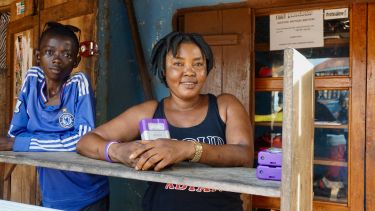- University of Sheffield engineers are helping to develop longer-life smart batteries, called MOPO Batteries, to bring clean and affordable energy to cities and communities off-grid or with unstable power networks in Africa
- MOPO Batteries, designed by Sheffield-based pay-per-use battery technology company Mobile Power, are portable, charged at solar powered hubs and can provide power for AC appliances such as cooking, fridges and DC appliances such as lighting, e-mobility and charging mobile phones
- MOPO Batteries are rented as and when needed through a cloud-based platform rental system
- Customers can make significant savings compared to the petrol generators many communities currently rely on
- Mobile Power has conducted more than 14 million MOPO Battery rentals across six Sub Saharan African countries
Longer-life MOPO Batteries that can help communities off-grid or with unstable power networks in Africa access clean and affordable energy, are being developed with the help of engineers from the University of Sheffield.
MOPO Batteries, designed by Sheffield-based pay-per-use battery technology company Mobile Power, are portable, charged by solar energy and can provide power for fridges, lighting and e-mobility. The batteries are rented as and when needed through a cloud-based platform rental system. Customers can make significant savings compared to the petrol generators many communities currently rely on.
There have already been more than 14 million MOPO battery rentals in Nigeria, DRC, Sierra Leone, Liberia, Chad, and Uganda with the current rate now standing at over 6 million per year.
Engineers from the University of Sheffield have been working with the company since 2017, using their skills and expertise in electrical engineering to help Mobile Power extend the lifetime of their battery cells.
Now, in a new knowledge transfer project, researchers from the University will help Mobile Power’s own R&D team develop longer-life MOPO Batteries and explore how they could be given a second life - for example, a battery no longer able to hold enough charge to power a vehicle could still be used to provide electricity for fridges or AC electrical items.
Professor Dan Gladwin, Professor of Electronic and Electrical Engineering at the University of Sheffield, said: “More than 740 million people don’t have access to electricity around the world and for many off-grid communities or those with unstable power networks, the only reliable power sources potentially available are petrol and diesel generators. These are often expensive, pricing many people out, but they are also dangerous and damaging to the environment.
“Smart batteries can play a major role in helping to connect communities to electricity. They are clean, safe and can be much cheaper to access than petrol and diesel generators. We’ve already seen through our project with Mobile Power how MOPO Batteries can make a difference to people’s lives across several African countries and we’re looking forward to helping further develop the technology so more people can access electricity.”
MOPO CEO Chris Longbottom said: “Our exceptional R&D team has successfully developed the technology and hardware currently being deployed throughout Africa. Partnering with the University of Sheffield, a renowned innovation hub, marks a significant milestone for MOPO. This collaboration represents the infusion of its expertise into our organisation, strategically elevating our own in-house R&D capabilities to enhance our competitive advantage in advancing a diverse range of MOPO Batteries, which play a pivotal role in delivering clean and affordable electricity across Africa.
“Notably, we have conducted over 14 million MOPO battery rentals from our solar powered hubs across six African nations, successfully providing clean and affordable pay-per-use energy and marking a substantial step towards our commitment to sustainable energy solutions in the region. These are exciting times as we drive innovation in energy provision in Africa and I would like to extend our gratitude to Innovate UK, KTN, and Professor Dan Gladwin for facilitating this collaboration.”
Thomas McKinney, an R&D Battery Engineer, and PhD student at the University of Sheffield, added: “Smart batteries could revolutionise energy systems for countries that have remote communities. I’m excited to use the expertise I’ve gained from the past eight years at university to help develop this technology, but also to see how it can help people and provide them with a clean, affordable energy source.”



